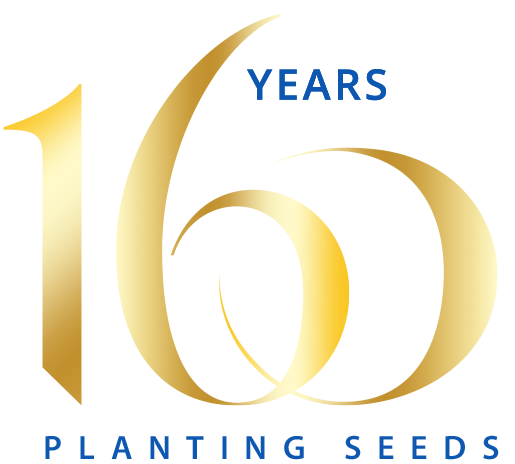“And I will bring the blind by a way they knew not; I will lead them in paths they have not known; I will make darkness light before them, and crooked things straight. I will do these things to them, and not forsake them”. Isaiah 42:16
In 1860, Mrs. Elizabeth Bowen Thompson arrived in Lebanon after hearing of the plight of displaced women, widows and orphans in the country. In 1862 Mrs. Thompson’s sister arrived from England with her husband, Mr. Mentor Mott to help with the fast growing ministry. In 1866, Mr. Mott visited the ruins in Baalbek. A young blind girl there inspired him to make the Gospel available to the blind. He decided to put the Gospel in the embossed Moon type in Arabic and then teach them to read in themselves. He began translating the Gospel of John and making plans to open the first school for the blind in the Middle East. In the summer of 1867 ophthalmia, a virus that causes inflammation of the eye, raged almost the degree of a plague in Beirut, along the sea-coast, and in some Syrian towns. It was calculated that about 2,000 people, old and young, lost their sight. Not only did those affected suffer, but also their families. Men were no longer able to provide for their families and in other homes all the children became blind at the same time. Having completed the Gospel of John, Mr. Mott opened a school for the Blind in Beirut in February 1868. This was the first school for the blind in the Middle East. Later, two other schools for the blind were opened in Tyre and Damascus.

The Lebanese Evangelical School for the Blind has endured through many hardships and wars including the First & Second World War and the Lebanese Civil war, and it has changed locations several times. The school began training their students in a trade. At first they were taught to work with cane and make baskets, and work with wool to help them support themselves. Later, they were also taught piano tuning, and switchboard operating. Today it continues to focus on spiritual development while also offering vocational training in cane work, machine knitting, computer, and culinary arts. There are also classes to teach the visually impaired how to carry out everyday tasks like Life Skills and Mobility.
Over the years, the number of people in Lebanon with visual impairment has decreased with the development of Laser Eye Surgery and other eye surgeries and the improvement of healthcare. In the year 2000, with the numbers of blind to reach dwindling, the school broadened its ministry to reach individuals with mental disabilities as well. Today, it is called the Benevolent Lebanese Evangelical School for Special Education and Development (BLESSED).
The new department is geared to help students with medium or mild mental disabilities whether they are small children or adults. Students follow daily programs designed to suit their individual needs and abilities. Their training includes spiritual nurturing, social skills, speech therapy, educational development, music, physical education and vocational skills. The opportunities in this area are seemingly endless and the campus is expanding to accommodate the growing student body. It is still the goal at BLESSED to reach its students for Christ and with God’s help, it will.
Our Mission is to offer a good, well rounded, spiritual, academic and vocational education for the visually impaired and special needs students and to prepare them for appropriate jobs and integration into society.
And our Vision is to expand our facilities and develop the school so that the visually impaired and special needs students have a wider academic and vocational curriculum, are trained by dedicated staff, and can become productive members of society.


